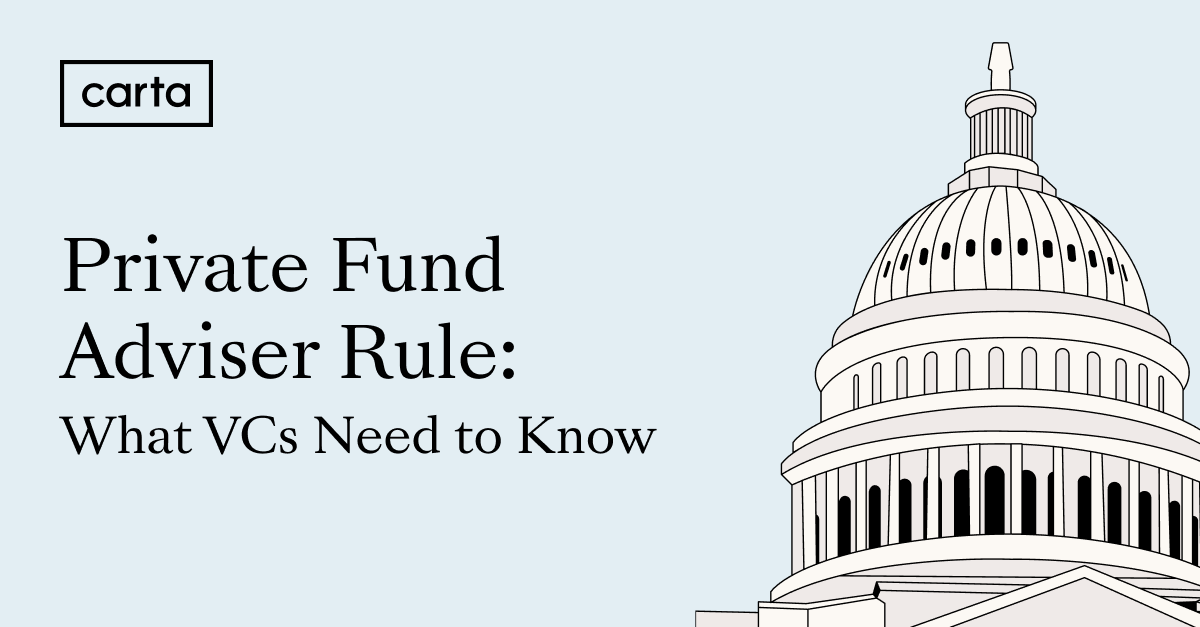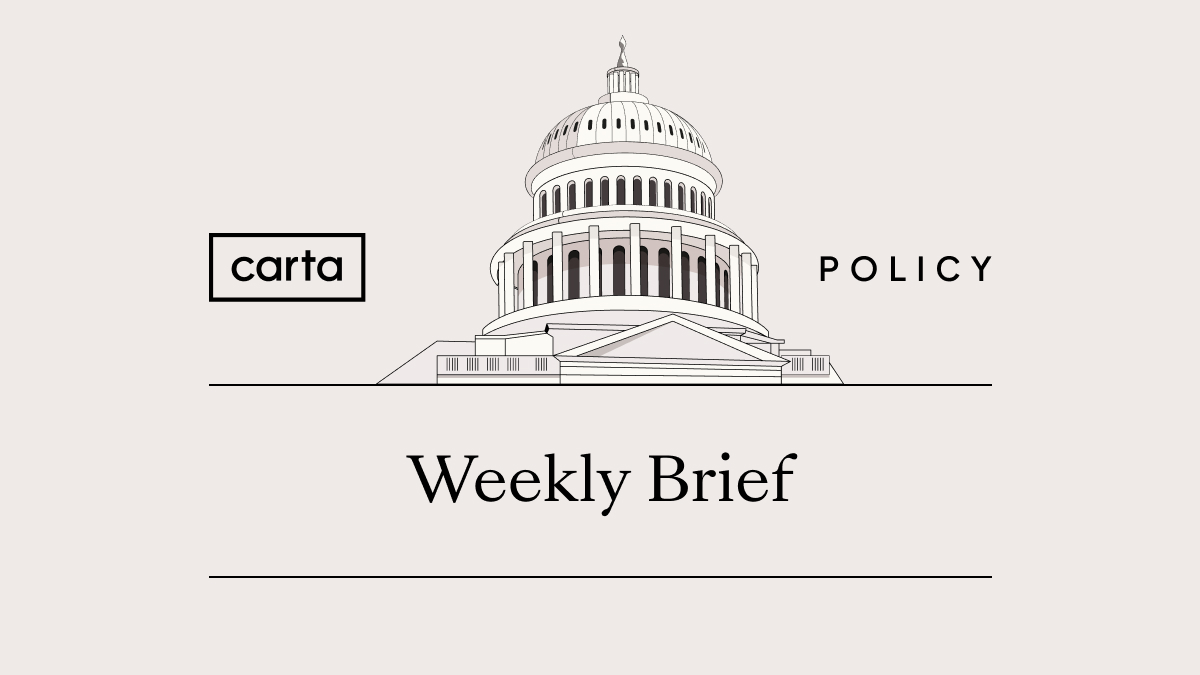Topline
-
Congress returns for a busy fall session as shutdown looms
-
Private fund industry files suit to vacate new SEC rules
-
SEC charges five firms for custody rule violations
-
New funding gives IRS upgraded AI technology to target private equity and law firms
-
FASB to implement new crypto accounting rules
-
Action imminent on California VC, data privacy, and climate disclosure bills
Congress returns for a busy fall session as shutdown looms
August recess is coming to an end, and Congress is back. Here’s what to expect in September:
-
Congress: Committees in the space will focus their agendas on oversight of the regulatory state. Both the House Financial Services Committee (HFSC) and the Senate Banking Committee will host SEC Chair Gensler this month, where we expect him to field policymakers’ concerns with the recently finalized private fund adviser rules, the highly controversial climate rule, and the agency’s aggressive enforcement agenda, including Gensler’s treatment of digital asset companies. HFSC will hold hearings on the CFPB’s rule on small business loan data, bank reforms and stress testing, and central bank digital currencies, among other familiar topics. Several other regulators are likely to appear before the committees this fall, and broader bipartisan, bicameral interest in topics like artificial intelligence and foreign investments will round out the agendas.
-
Government funding: As is the new normal, September will unfold against the backdrop of a potential government shutdown. If Congress fails to enact a long-term—or, more likely a short-term stopgap—spending agreement, current levels of government funding will expire after September 30. The slim margins in both chambers (particularly in the House, where the conservative Freedom Caucus has a small but strong voting bloc) only complicate matters.
September will be a busy month in Washington, and the Carta policy team will remain closely engaged as developments unfold throughout the fall.
Private fund industry files suit to vacate new SEC rules
As expected, a group of trade associations representing the private fund industry filed a lawsuit to vacate the SEC’s recently adopted private fund adviser rules in the conservative Fifth Circuit Court of Appeals. The groups argue the SEC lacked authority to promulgate the rules, failed to follow proper rulemaking procedures, and that the rules were otherwise “arbitrary, capricious, an abuse of discretion, and contrary to law.” The private fund ecosystem has been laying the groundwork for legal challenge, and these arguments will be bolstered by the dissenting statements of the Republican SEC Commissioners, who not only objected to the substance of the rule, but seriously questioned the SEC’s authority to adopt these new standards.
Why it matters: While softened from the original proposal, the new private fund adviser rules will fundamentally change how private equity and venture capital are regulated and will impose a host of new compliance challenges, costs, and obligations. Although the judicial branch has traditionally been deferential to the SEC and other regulators through the lens of the Chevron doctrine, as of late, courts have viewed regulatory authority with more scrutiny. If the court agrees the SEC exceeded its authority, it could pare back the final rule even further, if not entirely.
What’s next: The filing of the petition for review is the first step, and the industry and SEC will file more detailed briefs outlining their positions later this fall. The lawsuit itself will not delay compliance dates with the rule, though there is a potential for a stay of the rules to be requested or granted by the court.

Learn more: What the SEC’s rule changes mean for private funds
SEC charges five firms for custody rule violations
The SEC is showing no sign of relenting in its aggressive enforcement of the private fund sector. This week, the Commission charged five firms with violations of the custody rule, which lists requirements for safekeeping client assets.
-
Lloyd George Management, Bluestone Capital Management, The Eideard Group, Disruptive Technology Advisers, and Apex Financial Advisors have all agreed to settle with the SEC and collectively pay more than $500,000 in fines.
-
It’s the second set of charges the SEC has revealed as part of what it described as a “targeted sweep” related to custody rule violations.
Bottom line:In addition to a rulemaking agenda targeting private funds and the private markets more broadly, the SEC is increasing its scrutiny of the industry through its enforcement and examination powers. Expect this scrutiny to increase as the SEC continues to implement the marketing and private fund adviser rules.
New funding gives IRS upgraded AI technology to target private equity and law firms
The IRS announced that a portion of its $80 billion funding provided by the Inflation Reduction Act of 2022 will be used towards a “sweeping, historic effort” to shift its enforcement attention to high-income earners, partnerships, large corporations and “promoters abusing the nation’s tax laws.”
-
A team of data science and tax enforcement experts have collaborated to apply machine learning technology to complex partnership tax compliance issues that previously had minimal IRS exam coverage.
-
By the end of September, the IRS plans to open 75 new investigations with the largest U.S. partnerships, which hold over $10 billion in average asset value.
Why it matters: The agency has been signaling its heightened enforcement interest for some time, and now it finally has the resources to target a group it has long been struggling to tackle- large hedge funds, private equity groups, real estate investors, and law firms.
FASB to implement new crypto accounting rules
This week, FASB unanimously voted to establish a new standard, beginning with 2025 annual reports, to use fair value accounting for bitcoin and certain crypto assets.
-
Current rule: The U.S. has not had specific accounting or disclosure rules for crypto assets, making businesses classify them as intangible assets with indefinite lives. Each year, companies review the value of crypto assets, write them down when they drop below the purchase price, or record a gain only when they sell—not if they continue to hold the asset.
-
New rule: FASB’s new standard will require companies that hold bitcoin and certain other crypto assets to record losses or gains immediately—similar to some financial assets—which would more accurately reflect their financial position and provide useful information for decision-making.
Why it matters: FASB’s latest decision is welcomed by companies and accountants for better reflecting the economics of crypto assets and potentially reducing cost and complexity for businesses going forward.
Action imminent on California VC, data privacy, and climate disclosure bills
The California state legislature is expected to pass a number of proposals that could have significant impacts on the venture ecosystem this legislative session, which ends on September 14.
-
VC diversity disclosures: SB 54 would require venture capital companies with headquarters in California, significant operations in California, investments in California businesses, or that solicit or receive investments from California residents—in other words, virtually all VC funds—to report certain demographic and other information about the founding teams of all of the businesses in which the VC invested over the prior calendar year.
-
Climate disclosures: SB 253 would require U.S.-based businesses with annual revenues exceeding $1 billion that do business in California to annually disclose the greenhouse gas emissions attributable to the business. SB 261 would require companies that do business in California and have annual gross revenues over $500 million to report on their climate-related financial risk. While these proposals share similarities with the SEC’s climate disclosure proposal, the CA measures go further and would apply to all companies that meet the revenue threshold—both public and private—and would require Scope 3 disclosures, which the SEC is expected to remove from its final rule.
-
Data privacy: SB 362 would allow California residents to request that companies delete all the data they have on a person, not just the data that company collected. It would also impose new audit and reporting requirements on data brokers, among other changes.
What this means:If signed into law as proposed, these bills will significantly increase the reporting burden for VCs and startups who operate in California. Given the expansive reach, there will undoubtedly be legal challenge, but the measures could help bolster related action at the federal level.
News to know
-
Lawsuits against private equity founders get a boost in Delaware courts. These lawsuits allege that the firms paid their founders for nothing in return, as part of a series of complicated tax deals. A judge’s ruling on a related case involving fellow private-equity firm KKR gives these lawsuits more heft and could trigger settlement talks between the firms and their investors.
-
Senate clears the way for a vote on Fed nominee. The U.S. Senate voted overwhelmingly this week to confirm Federal Reserve Governor Philip Jefferson to be vice chair of the U.S. central bank. This is the second-to-last step in a process that would install Jefferson with solid bipartisan backing in the No. 2 spot at the Fed.
-
CFTC Commissioner Pham calls for crypto pilot program. At a conference this week, Commissioner Pham floated the idea of the CFTC “testing” crypto pilot regulations. The tentative regulations would cover crypto firm registration, risk management and disclosure requirements.
-
CFPB report highlights the role of big tech firms in mobile payments. The report explains how regulations imposed by mobile operating systems can have a significant impact on innovation, consumer choice, and the growth of open and decentralized banking and payments in the U.S.
Upcoming events
-
Carta Policy Weekly Live – Weekly at 9:00 a.m. PT / 12:00 p.m. ET
-
Senate Banking Committee hearing: “ Oversight of the U.S. Securities and Exchange Commission” – September 12 at 7:00 a.m. PT / 10:00 a.m. ET
-
CFTC Commissioner Pham will deliver a keynote titled “ Digital Assets, Retail, Social Media & AI: What’s Next?” at the 13th Nasdaq Surveillance Conference – September 12 at 5:20 p.m. PT / 8:20 p.m. ET
-
House Financial Services Committee hearing: “ Oversight of the Committee on Foreign Investment in the United States (CFIUS) and Other Efforts to Strengthen National Security in the United States” – September 13 at 7:00 a.m. PT / 10:00 a.m. ET
-
House Small Business Economic Growth, Tax and Capital Access Subcommittee: Enabling Success: Examining the Competitive Landscape for Small Businesses – September 13 at 7:00 a.m. PT / 10:00 a.m. ET
-
House Financial Services Committee Financial Institutions and Monetary Policy Subcommittee hearing: “ Implementing Basel III: What’s the Fed’s Endgame?” – September 14 at 7:00 a.m. PT / 10:00 a.m. ET
-
House Financial Services Committee Digital Assets, Financial Technology and Inclusion Subcommittee hearing: “ Digital Dollar Dilemma: The Implications of a Central Bank Digital Currency and Private Sector Alternatives” – September 14 at 11:00 a.m. PT / 2:00 p.m. ET
-
Securities Enforcement Forum Central 2023 – September 19 at 6:30 a.m. PT / 9:30 a.m. ET
-
SEC Small Business Capital Formation Advisory Committee Meeting – September 19 at 7:00 a.m. PT / 10:00 a.m. ET
-
Carta event: What’s New, What’s Next: Carta Fund Admin in Q3 – September 20 at 10:00 a.m. PT / 1:00 p.m. ET
-
Gensler to testify in front of the House Financial Services Committee – September 27, time TBD

